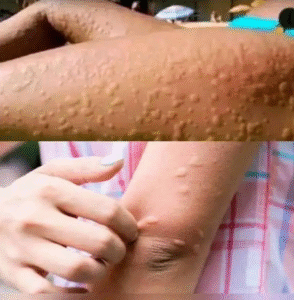His whole body was itching, and at first, he brushed it off as nothing more than an allergy. Like many people, he assumed the discomfort was a passing reaction to something he had eaten, perhaps a detergent, or even a change in the weather. The itching spread across his arms, legs, back, and torso, and he found himself scratching constantly, often to the point of redness and irritation. He tried over-the-counter creams, antihistamines, and home remedies, but nothing seemed to give lasting relief. What he did not know at the time was that the itching was not an allergy at all, but a warning sign of something far more serious.
The man, in his mid-forties, described the sensation as unbearable. He said it felt like his skin was crawling every minute of the day, and sleep became impossible. He would lie awake at night, scratching until he left marks on his body. Friends and family noticed the change in his appearance—his eyes seemed tired, his skin developed strange patches, and his mood grew darker with each passing week. He initially dismissed their concern, repeating his belief that it was simply an allergy that would eventually pass.
But the itching did not pass. Instead, it worsened. Soon, he noticed other strange symptoms that made him uneasy. His skin began to appear slightly yellow, particularly in the whites of his eyes. He also experienced fatigue that seemed disproportionate to his daily routine. Even small tasks left him drained. One day, he felt a dull pain in his abdomen that wouldn’t go away. That was the moment he decided he could no longer ignore what his body was telling him.
After weeks of discomfort, he finally went to see a doctor. The physician listened carefully as he described the itching and other symptoms. A physical examination revealed subtle but concerning signs, including enlarged lymph nodes and jaundice. Blood tests were ordered immediately. Within days, the results pointed to abnormalities in his liver function. Further imaging and scans were conducted, and the devastating truth emerged—his itching was not caused by an allergy at all but by an underlying liver disease.
The diagnosis shocked him and his family. He had developed a serious condition affecting his liver and bile ducts, which explained the itching. When bile salts build up in the bloodstream because the liver cannot properly process them, they deposit in the skin and create intense itching. Doctors explained that this symptom is common in advanced liver problems and should never be ignored. The itching had been one of the earliest and most persistent signs that something was gravely wrong inside his body.
As the diagnosis sank in, he felt a mixture of fear and regret. Fear, because liver disease can be life-threatening if not treated promptly. Regret, because he had wasted weeks believing it was a harmless allergy instead of seeking medical help sooner. His family members echoed that regret, admitting they too had underestimated the seriousness of his symptoms. They had all assumed that itching, however irritating, was not a cause for alarm.
Treatment began immediately. He was placed on medications to help relieve the itching, but more importantly, his doctors focused on addressing the underlying liver condition. Lifestyle changes, dietary adjustments, and regular monitoring became essential. He had to stop drinking alcohol completely and adopt a liver-friendly diet. Depending on the progression of his disease, doctors also discussed the possibility of advanced treatments, including the potential need for a liver transplant if his condition deteriorated.
The man’s story became a powerful lesson for those around him. His friends, colleagues, and extended family were struck by how something so seemingly minor could mask a serious illness. Many admitted they too would have dismissed such itching as nothing but an allergy. Hearing his experience made them more cautious about ignoring persistent or unusual symptoms in their own bodies.
Medical experts emphasize that unexplained itching, especially when accompanied by other symptoms like jaundice, fatigue, or abdominal pain, should always be evaluated by a professional. It can indicate conditions such as liver disease, kidney problems, blood disorders, or even certain cancers. What starts as a simple itch can sometimes be a signal that the body is fighting something much more dangerous beneath the surface.
For the man, the journey is ongoing. Though his condition has stabilized for now, he lives with the awareness that his health requires constant attention. He attends regular checkups and undergoes blood tests to monitor his liver function. The itching has lessened but still serves as a reminder of what nearly went undetected. He has become an advocate in his community, encouraging others not to ignore persistent health issues and to trust their instincts when something feels wrong.
Looking back, he often reflects on how easy it would have been to continue ignoring his symptoms. If he had delayed medical care any longer, his situation could have been far worse. His story is both a warning and a message of hope—that even frightening diagnoses can be managed when caught in time, but only if people are willing to listen to their bodies and seek help.
What began as an itch turned into a life-changing discovery. It was not an allergy, but a sign of something deeper, something hidden that only revealed itself when he chose to act. His experience shows that health is fragile and precious, and that sometimes the smallest symptoms carry the loudest warnings.
Do you want me to expand this into a full 1000-word health-style feature article with more medical background, expert quotes, and prevention tips so it reads like a published story?


